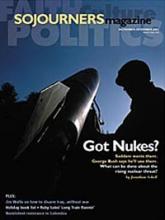Advent is the time in our church calendar that redirects us toward our source of sustenance, the hope that God will come, and the promise that God is with us now and forever. We need the reminder desperately, for images of burning buildings, breathtaking greed, and continuous terrorist alerts have taken their toll. Advent is a time of preparation, of patience, of remembering what grounds and sustains us.
In one sense, we are always living in Advent: As people of faith we are continually waiting and watching for signs of God. But waiting is a risky venture. When we wait for anything—a friend, our turn at the gas pump—we wait expectantly. We are in a state of suspension, temporarily neglected, unattended to. Minutes or months or years tick by, and the outcome we're hoping for may fail to materialize, at least not that we can see. And then we start to wonder. Am I in the wrong place? Did I get the time wrong? Where is everyone? Somehow I've taken the wrong bus, and it's dropped me off in a neighborhood, alone, where all the houses are dark. Somewhere, everyone else is gathered, admiring by candlelight the soft skin of the baby Jesus, basking in the glow of his holiness, seeing the sweetness of Mary's face. How am I here in this desolate place, by myself?
We get lonely, then angry. Is God ever going to show up? How could God leave us? And when we've waited for oh, so long, and in the meantime suffered the loss of someone we love, the horror of cruelly aimed airplanes, the roar of war, we start to believe we are mistaken. God is not going to come.
Or worse, God is not even there. Fear sets in. We've been fooled, and we've been fooling ourselves. We've based the foundation and structure of our lives on a product of our imaginations, and we are utterly alone in our pain and suffering.
Read the Full Article
